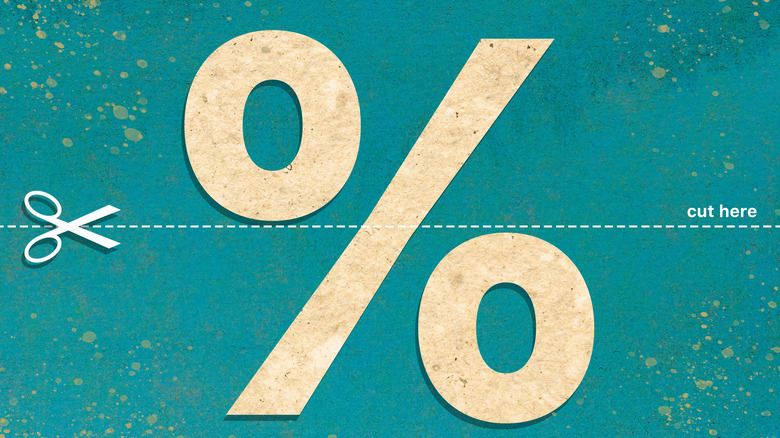The World's Wealthiest People Have These Credit Card Habits In Common
Credit cards play a vital role in the modern consumer experience. Forbes reported that 82% of American adults had at least one credit card in 2022, and they used these financial tools for all manner of important decision making processes. Credit cards can function as an emergency spending backstop when things get tough. They can also feature as a means of buying groceries or gasoline each week to rack up a steady stream of rewards points. Unfortunately, many people abuse their credit cards, building up a balance that carries over from month to month and increasingly weighs down the financial mobility of the user as interest charges pile up. Roughly half of all Americans carried a balance on their credit card accounts in June of 2025, showcasing the dangers of poor or even average credit management habits.
For those looking to change their relationship with credit accounts, it might be instructive to explore how wealthy users interact with their cards. Most wealthy individuals have at least one card, much like the general public, but the way they utilize their accounts differs, sometimes in huge ways. These are some of the most important habits that the world's wealthiest individuals maintain with their credit accounts.
Basically all wealthy people use credit cards
Contrary to the aversion that plenty of vocal wealthy individuals share when it comes to credit card accounts and utilization, virtually all wealthy individuals have credit cards in their possession. A credit card is a revolving payment option that makes spending money in the present easier. This can create a trap for those who don't manage the account responsibly, but it can't equally represent an opportunity for card holders who do.
Even though pundits like Dave Ramsey and others actively rail against credit cards, saying that the way to wealth is to spend in cash rather than credit, the statistics seem to suggest a different reality. The Money Guy Show surveyed millionaire clients and found that 99% of them have at least one credit card in their possession. The way they leverage that line of credit is different from the average user's approach, however. This is where some of the most important habits that they share begin to take shape.
Avoid carrying over balances
Wealthy credit card users see these accounts as a trade rather than a pool of resources to draw from when making purchases. Borrowed capital is provided to you by a card issuer of some variety, but what you're really borrowing from is your future, not a company here in the present. If you borrow $1,000 today from American Express or Discover, next week or month you'll start tweaking elements of your budget that will morph around repaying that $1,000 debt. By paying it off before the end of the month, you may be able to borrow only $1,000 from your future self. But if you carry this balance over into the next statement period, that debt will quickly begin to grow with the addition of interest.
Wealthy borrowers are intimately aware of the added costs that come with slow repayment. While virtually all wealthy people have credit cards, almost all of them prioritize paying off their balances in full whenever they break out the plastic to pay for something. This allows them to pay only the "list price" when making purchases instead of allowing interest to accrue on their account and increase the total cost of everything they've spent money on throughout the month.
But take advantage of cardholder benefits
Many wealthy credit card users hold on to rewards cards specifically. If you are going to utilize borrowed cash to pay for something and then clear the balance before it starts taking on interest payments, you might as well gain some benefit from this strategy beyond the increased spending ability in the moment. Wealthy users take advantage of the rewards opportunities that card issuers offer to entice new signups. There's a definite dark side to cash-back credit card rewards and travel point accumulation, but much of this centers on a personal inability to clear balances and prevent interest from building up. If you're paying interest on top of the base repayment obligation, you're actively subtracting from the value these rewards provide.
Wealthy users understand this relationship and the difference between accumulating free money and rewards points and paying for those parks through interest adjustments. Keeping these additions as a free upside makes using a credit card increasingly valuable. However, that's not the extent of the benefits that high net worth users see. There are plenty of things you should only purchase with a credit card including reservations at hotels and car rentals. When renting a car, for instance, using a credit card to add built-in insurance coverage to support your adventures. This means you won't have to pay for added coverage from the rental agency.
Keep a card available, but turn to cash first
High net worth credit card users don't tend to actually use their cards very often. Many of these cardholders opt to spend physical cash or use their debit card instead of following payments through another hurdle. Managing your cash flow becomes more complicated when you spend on one card and then repay it with another account. But this is only one issue that arises. Moving away from a reliance on credit accounts allows you to build in a comprehensive defense against interest.
This approach allows users to leverage their credit card as a true emergency spending outlet when necessary. If you carry a zero balance on your card, worrying about spending up near the limit or managing an increased repayment burden over your existing obligation doesn't factor into the equation. At the end of the day, using a credit card sparingly allows for better budgeting control. If you only spend what's in your checking account, you'll only be spending what you have available rather than dipping into future resources.
Pay off spending the same day a purchase is made
A different approach that some wealthy credit card users take involves more routine use of credit accounts. However, this strategy pairs a much more aggressive repayment mindset with that increased level of usage. Instead of spending with the card and then evaluating the balance owed at the end of the month, some high net worth users swipe their card and then immediately repay that amount from their bank account. The result is a little more intensive in managing accounts, but it functionally serves as a through valve to spend money from your bank account rather than against the available credit you have. At the same time, this approach allows for the accumulation of rewards points or cash back perks that come from spending on the card rather than with your debit account.
Paying off purchases right after you make them might seem like overkill. However, for a user who is excessively aware of the impact that interest can have on long term financial planning, this is an ideal way to balance using a credit card with managing an active and consistently tailored budget (something frugal people tend to prioritize). By waiting until the end of the monthly term to settle up with your credit card issuer, users can fall into the trap of overspending. When you buy everything in cash you can only use the money you have on hand. Credit cards can lull users into a false sense of security that enables them to overspend without keeping track of their purchases. Paying off each purchase individually changes this reality and makes managing a credit account feel far more like using your debit card directly.
They feature as authorized users on parents' cards early in life
One interesting quirk that frequently features in the card usage habits of wealthy individuals involves the age at which they start using these products. It's possible to add an authorized user to your account with little restriction. Spouses are frequently users of this feature, allowing both to draw from the same account without managing who's holding the card. But this isn't the only value of an authorized user. It's also a great way to give someone else spending privileges on a credit account to give them the opportunity to build their credit score. Of course, you run the risk of having to pay back lots of spending, so this should be done sparingly.
One approach involves adding children as authorized users to a credit account. Wealthy individuals frequently add their infant or young children as authorized users to start building credit in their name a decade or more before they have an opportunity to open a card for themselves. Stashing this card away in a drawer or even cutting it up as soon as it arrives delivers a credit building opportunity without any active management required. On the other hand, giving a responsible youth access to your credit account can be a great way to help build good financial management habits into their life before they have an opportunity to impact their own financial future. Both avenues feature as important tools that wealthy people frequently utilize.
Credit card accounts can act as a free-floating borrowing option
Wealthy people might not frequently fall back on credit cards for everyday spending, but when a large, time sensitive purchase comes into view these tools can be instrumental. It might ultimately make more sense to buy an asset or item in limited supply right away, even if the cash to complete the transaction isn't freely available. Rather than using it as an emergency spending tool, some high net worth individuals treat their credit card as more of a short-term loan option to tap into when necessary.
Plenty of wealthy investors keep their assets in a hodgepodge of liquid and difficult to access pools. Money kept in a high interest savings account can be easily withdrawn when needed, but it might take a day or two to actually have funds on hand to make a purchase. Using a credit card allows this kind of investor the freedom to keep their cash in a semi-liquid state that also pays interest or provides extra protection in some way or another. Swiping the card and then withdrawing enough cash to cover the purchase in a day or two is a great way to get the best of both worlds.
New card selection often focuses heavily on interest rate offers
Even though most high net worth individuals prioritize paying off credit card balances in full every month, these borrowers still keep an eye on interest rates and minimize the risk of costly consequences. When shopping for a new card to support changing financial needs, wealthy cardholders frequently select cards with the lowest interest rates available, even over alternatives that might provide better cash back perks or other rewards opportunities. Wealthy users tend to seek out solutions that provide the upside required while reducing the potential for negative outcomes. Thinking about credit card options in a similar framework to investments helps these users focus on the financial solutions that best meet their needs while passing on the ones that don't.
This tendency highlights an important change in perspective for wealthy card users. In much the same way that an investor explores the entirety of a new stock market selection, wealthy card holders think about the big picture when considering a new credit card for their needs. The totality of the offer to use one card over another is something that doesn't always feel important for everyday users, but it's this type of big picture thinking that allows wealthy cardholders to maintain their position and continue growing rather than risking setbacks in their financial voyage.
Most wealthy individuals value experiences over possessions
A Mastercard study from 2024 found that most wealthy individuals are more interested in spending their money on experiences that add value to their lifestyle rather than possessions. Everyone needs to buy things, but seeking to minimize the cost of the physical goods you require can be a great way to leave more money in your budget to spend on action items that will enhance your lived experience. The Mastercard study pegged this number at 59% of wealthy cardholders. High profile investors seem to validate these findings, with Jim Cramer, for instance, noting that he is an avid frugal spender but splurges on things like tickets for live sporting events.
By minimizing the price you pay for things like groceries, car loans, and books (something you should always consider buying used), you'll free up more capital to go see your favorite musical acts, to buy better seats at the next football or baseball game you attend, or to travel more. Building these kinds of purchases into your budget will take time, of course. This can feel a little like the tone deaf advice to cut that morning cup of coffee out of your daily ritual, but the reality is that prioritizing what you want to spend your money as a big picture habit (not just on that cup of Joe) on can create a snowball effect over the long term that allows you to save more money for the things that will enrich your life. This might be additional funding toward your retirement accounts, or an extra few hundred dollars every month that can be used toward an impactful lifestyle upgrade.
Credit card accounts tend to provide built-in fraud protection services
One unique use for a credit card actually has nothing to do with the buying power it affords. Instead of sticking a new piece of plastic in your wallet and using it to spend money out and about, it's worth noting that your credit card also delivers a variety of important pieces of information about you. When you log into your credit card accounts, you'll notice that one of the prominent figures displayed on the screen, regardless of the card issuer, is your credit score. Virtually all brands that provide credit card services to consumers integrate at least some kind of credit tracking tools. High net worth users take these tools seriously and frequently monitor alerts on their accounts with the help of these inclusions.
Another more direct benefit in this vein is the fraud prevention services that card issuers build into their total package. Indeed, many wealthy credit card holders don't actually use their card at all, but rather sign up for a new credit card because of the issuing company's track record of success when it comes to monitoring fraudulent activity. Scammers and thieves have become increasingly sophisticated in their efforts to part people with their personal information. Fraud monitoring services have needed to deploy a similar agility in their efforts to combat these issues. Therefore, using a number of different credit card services to integrate extra layers of identity theft protection and fraudulent account defense, and for free, is a no-brainer.
Moving through options is natural, but wealthy users don't tend to churn cards to rack up points
Many credit card users churn through different card options in an effort to capitalize on the sign up bonuses that each unique company offers. If you've been suspected of card churning, this can actually be a reason for declining a credit card application that goes beyond your credit score or usage history. Card churning isn't illegal, but credit card companies tend to shy away from issuing cards to users who they suspect will only use the tool for long enough to take advantage of major, free perks. It's well-documented that these benefits are designed to suck in new signups in an attempt to get users to overextend and start paying interest to the card issuer as quickly as possible. This is where credit card companies make a significant amount of their profits.
Wealthy credit card users will look to perks and other benefits associated with cards, certainly. But most won't seek to open a new account just because an expanded benefit offer is on the table. A great example can be found in airline-specific credit cards. Most will offer a standard number of bonus miles after hitting a spending figure, perhaps 50,000. But at certain times you'll catch a flight and see a leaflet offering a larger reward of 60,000, or 75,000 instead of the standard offer. This can be extremely valuable to a typical user, but the wealthiest consumers don't really see this extra bonus move the needle enough to make them act.
Do whatever it takes to prioritize paying off balances
At the end of the day, the primary thing that separates the wealthiest credit card users in the world apart from the masses is the extent they're willing to go to when paying off balances. The most expensive debt you'll carry comes in the form of credit card usage. The average card issued today comes with an interest rate of nearly 25%. There's just no legitimate way to earn that kind of return on any investment you'll make. This distinction is what separates what are classically known as good and bad debts. The average 30-year mortgage rate today sits at 6.63%, and so a shrewd investor may be able to realistically break even or potentially gain ground with free cash invested in the stock market or elsewhere instead of paying off their mortgage faster. The same can be said for other types of borrowing like student loans, leading to a question over whether it's a good idea to aggressively pay off student debt. Credit card debt isn't like this.
Credit cards are expensive and feature a rapidly paced snowballing effect. The longer you take to pay off your debt the more it will cost you at an ever-increasing rate. Wealthy borrowers know this and they do whatever it takes to clear balances. Most don't leave debt obligations on credit card accounts to roll over from one statement period into the next, even if that means sacrificing elsewhere in their financial or lifestyle plans.












